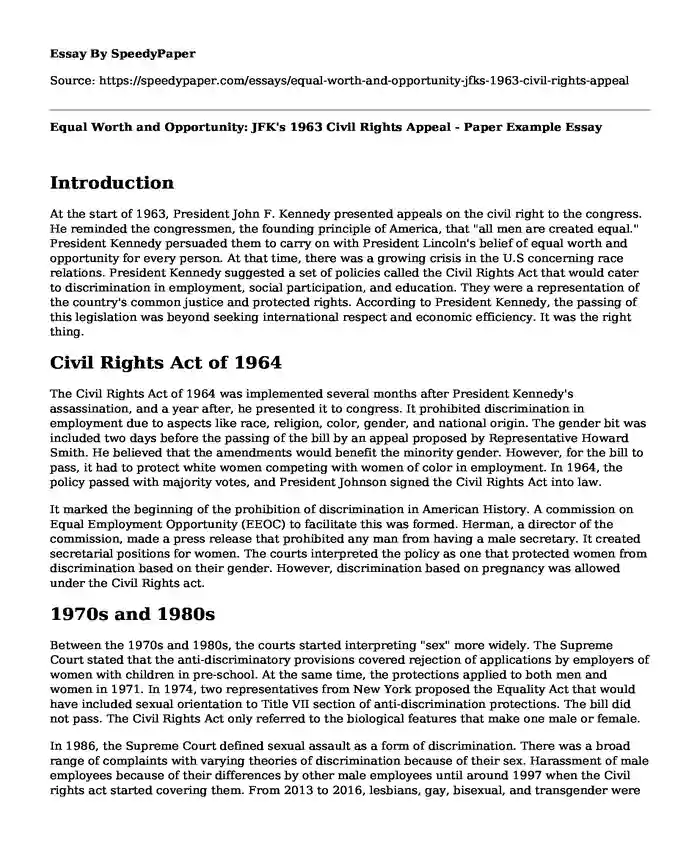
| Type of paper: | Essay |
| Categories: | Law Civil rights |
| Pages: | 3 |
| Wordcount: | 731 words |
Introduction
At the start of 1963, President John F. Kennedy presented appeals on the civil right to the congress. He reminded the congressmen, the founding principle of America, that "all men are created equal." President Kennedy persuaded them to carry on with President Lincoln's belief of equal worth and opportunity for every person. At that time, there was a growing crisis in the U.S concerning race relations. President Kennedy suggested a set of policies called the Civil Rights Act that would cater to discrimination in employment, social participation, and education. They were a representation of the country's common justice and protected rights. According to President Kennedy, the passing of this legislation was beyond seeking international respect and economic efficiency. It was the right thing.
Civil Rights Act of 1964
The Civil Rights Act of 1964 was implemented several months after President Kennedy's assassination, and a year after, he presented it to congress. It prohibited discrimination in employment due to aspects like race, religion, color, gender, and national origin. The gender bit was included two days before the passing of the bill by an appeal proposed by Representative Howard Smith. He believed that the amendments would benefit the minority gender. However, for the bill to pass, it had to protect white women competing with women of color in employment. In 1964, the policy passed with majority votes, and President Johnson signed the Civil Rights Act into law.
It marked the beginning of the prohibition of discrimination in American History. A commission on Equal Employment Opportunity (EEOC) to facilitate this was formed. Herman, a director of the commission, made a press release that prohibited any man from having a male secretary. It created secretarial positions for women. The courts interpreted the policy as one that protected women from discrimination based on their gender. However, discrimination based on pregnancy was allowed under the Civil Rights act.
1970s and 1980s
Between the 1970s and 1980s, the courts started interpreting "sex" more widely. The Supreme Court stated that the anti-discriminatory provisions covered rejection of applications by employers of women with children in pre-school. At the same time, the protections applied to both men and women in 1971. In 1974, two representatives from New York proposed the Equality Act that would have included sexual orientation to Title VII section of anti-discrimination protections. The bill did not pass. The Civil Rights Act only referred to the biological features that make one male or female.
In 1986, the Supreme Court defined sexual assault as a form of discrimination. There was a broad range of complaints with varying theories of discrimination because of their sex. Harassment of male employees because of their differences by other male employees until around 1997 when the Civil rights act started covering them. From 2013 to 2016, lesbians, gay, bisexual, and transgender were incorporated into Title VII's sex discrimination provisions (Lytle, 2019). EEOC began following up on allegations of discrimination associated with gender identity and sexual orientation.
An employer must adhere to the Civil Right act. One, because the law offers justice for all, and there are legal consequences of not adhering to the law. Secondly, according to the book of Psalms 119:1-6, favored are the people that walk according to the Laws of God. All the commandments in the Bible are summed up into the law of love. Love for the Lord, oneself, and neighbors. Well, discrimination is a display of hatred based on other people's differences, such as race and sex, which is contrary to the law. God blesses those that obey Him.
The face of the American workplace has dramatically evolved over the past five decades. Organizations have created job opportunities for everyone despite race, sex, sexual orientation, and cultural background. Diversification in organizations is a way of complying with the law. Also, it adds value by incorporating varying perspectives and thoughts. The ratio of the wages earned by men to that received by women has decreased. However, there is still more to be done to achieve equality in the workplace.
References
Bible Gateway passage: Psalm 119:1-6 - New International Version. https://www.biblegateway.com/passage/?search=Psalm+119%3A1-6.
Lytle, T. (2019, August 16). Title VII Changed the Face of the American Workplace. SHRM. https://www.shrm.org/hr-today/news/hr-magazine/pages/title-vii-changed-the-face-of-the-american-workplace.aspx.
Title VII. BrainMass. https://brainmass.com/law/business-law/history-evolution-title-72150.
Title VII of the Civil Rights Act of 1964. U.S. Equal Employment Opportunity Commission. https://www.eeoc.gov/statutes/title-vii-civil-rights-act-1964.
Cite this page
Equal Worth and Opportunity: JFK's 1963 Civil Rights Appeal - Paper Example. (2023, Sep 17). Retrieved from https://speedypaper.com/essays/equal-worth-and-opportunity-jfks-1963-civil-rights-appeal
Request Removal
If you are the original author of this essay and no longer wish to have it published on the SpeedyPaper website, please click below to request its removal:
- The LGBTQ Movement - Free Essay Sample for Students
- Law Essay Sample: Declaratory Judgment, Counterclaim, Shrink-Wrap License
- Essay Example on Affective Disorders and Criminal Behavior
- Good Officer - Interview Essay Example
- Essay Sample on Critical Analysis of the Poem "Not a Number"
- Essay Example: Comparison of Programs in Crime Solution
- Cop's Responsibilities: Beyond Enforcing Laws - Essay Sample
Popular categories




